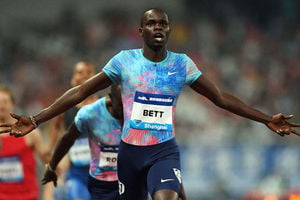
The 2019, 3,000m Africa Junior Silver Medalist Emmaculate Anyango trains at Moi University Annex Campus grounds in Eldoret town, Uasin Gishu County on January 27, 2024.
In less than one year, eight up and coming Kenyan athletes have been banned for various doping offences.
Perhaps the most famous of them is the 2019 world 10,000m bronze medallist Rhonex Kipruto, 24, who was banned for six years for "a deliberate and sophisticated doping regime" in June this year.
Kipruto was provisionally suspended on May 11, last year after irregularities were detected in his Athlete Biological Passport (ABP) dating back to July 2018.
His race results since September 2018 have been expunged meaning that his bronze from 2019 world championships and his 10km world record of 26:24 from 2020 Valencia do not stand.
Kipruto only remains with the world under-20 10,000m title from July 2018 in Tampere, Finland.
Two high profile cases were also registered involving the 2023 world cross country mixed relays gold medallist Brenda Chebet, 20, and Zenah Jemutai, 21 who were provisionally suspended in July and June last year.
On Friday last week, Emmaculate Anyango, 23, the second fastest woman in 10km Road Race and fourth-placed finisher at the 2024 World Cross Country Championships, was provisionally suspended for positive EPO and testosterone tests.
Fast-rising Faith Chepkoech, 21, was banned for three years two weeks ago for using EPO while the 2017 world youth 800m champion Jackline Wambui, 23, was banned for two years for the use of Norandrosterone last year.
Wambui’s case was backdated to 2021. The 2022 world under-20 3,000m champion Betty Chelangat was 20 years old when she was banned for three years in December last year for using anabolic steroids.
Winnie Jemutai was 19 years old when she was flagged down for doping in November last year and banned for three years.
AIU has not reported any Kenyan junior cases (under-20) dating back to 2020 save for Sheica Cherotich, who was 19 years when she was banned for three years in May 2022.
Anti-Doping Agency of Kenya (Adak) head of education and research, Martin Yauma, claims that some coaches, trainers and meet managers are behind doping cases of up and coming athletes.
He reckons these athletes do not deliberately use banned performance enhancing substances but are made to take by their minders.
Adak’s legal officer, Bildad Rogoncho said that doping among youth is driven by different factors, but mainly economic pressure as Athletics Kenya director of youth and development, Barnaba Korir alleged a syndicate could be involved in helping youngsters dope.
Sports psychologists Rowena Tirop and Kanyali Ilako noted everyone expects young athletes to be at their best all the time, and sometimes, they strongly desire to stay at the top and get noticed by any means necessary.
They say that the pressure to run fast times, perform better and recover faster opens these young athletes’ minds to shortcuts.
“Some coaches, managers and trainers have taken advantage of these youngsters since they don’t know the consequences of doping,” said Yauma.
He observed that the youngsters can’t cope with the repercussions after being banned hence slump into depression after those who drive them to doping abandon them.
“They are hoodwinked for quick wins through shortcuts but nobody is there for them when they are caught. In most cases, it’s the athlete who suffers and not those behind doping,” said Yauma.
The death on Sunday of 2016 world under-20 800m champion, Kipyegon Bett, is a case in point.
Bett, who passed on at Tenwek Hospital, Bomet County where he had been admitted since Monday, shot to the limelight when he won gold in 800m at the 2015 Africa Youth Athletics Championships in Réduit, Mauritius.
He went on to claim bronze in 800m at the 2015 World Youth Athletics Championships (Under-18) in Cali, Colombia before upgrading to gold over the distance at the 2016 World Under-20 Athletics Championships in Bydgoszcz, Poland.
In the second meet of the 2017 Diamond League in Shanghai, Bett won the 800m event in 1:44.70 before claiming a bronze medal at the 2017 World Athletics Championships in London.
However, at the age of 20, and touted as the next David Rudisha, the rising star tested positive for performance enhancing drug, Erythropoietin (EPO), and received a four-year ban in November 2018.
Bett made a return to competition in 2022 competing in 400m hurdles at the Third Athletics Kenya Track and Field Meeting, finishing third but had not competed since then.
His family and friends revealed that from being a teetotaller he became a heavy alcohol consumer and went into depression.
“It’s like they take an oath not to reveal they took banned substances, opting to suffer the consequences alone. We have introduced whistle-blowers protection programmes but nothing has come of it,” said Yauma.
Elite youngsters who make it on the big stage invariable see their earnings blossom.
“That is when these managers, coaches and some doctors take advantage. Some of these athletes are too illiterate to understand or know what their doctors or physiotherapists inject or massage them with,” said Rogoncho.
The Adak legal officer disclosed that the youth are under pressure to post results that will secure them places in big management camps and when competition is stiff, they resort to shortcuts.
At the end of the day, Rogoncho said that doping is a personal problem and that ignorance isn’t defence.
Sports psychologist Ilako explained that there's a constant comparison to others, whether it's from coaches, fans, or even themselves that puts pressure on the youngsters.
“For some young athletes, doping becomes this 'shortcut' to meet those expectations,” said Ilako. “It’s not always about winning, but about staying relevant and not letting anyone down.”
Ilako said that when they see others doping and sometimes succeeding, it makes it even harder to resist. “I think it’s less about wanting to cheat and more about feeling like you don’t have another option to reach the top," said Ilako.
Korir said the rise of junior athletes’ doping cases was a worrying trend and the government must be engaged on the investigative part to break the doping web.
"The huge problem we are facing is that these youngsters are not coming out to tell who is involved. They can pass the information to Athletics Integrity Unit if they think AK can't help," said Korir.
“However, counselling can still happen," he said.









